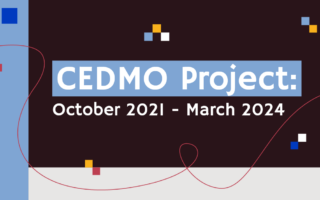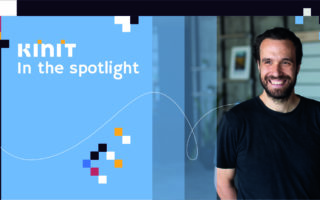What's
CEDMO brief: Three quarters of Slovaks perceive the spread of disinformation as a threat to the security of Slovakia
The recent CEDMO survey has uncovered interesting insights into the proliferation of disinformation in Slovakia. A special edition of this survey, dedicated primarily to the upcoming presidential elections, focused on identifying the most prevalent disinformation narratives in the online sphere. Conducted by the research agency Ipsos in collaboration with the CEDMO project, where KInIT serves as a partner, this survey sheds light on critical aspects of disinformation dynamics.
The spread of disinformation on the internet is perceived as a serious issue by 77% of the Slovak population, the highest percentage so far among all previous waves of the longitudinal CEDMO Trends survey, conducted on a monthly basis since August 2023. There is also an increasing number of people who perceive disinformation as a threat to the security of the Slovak Republic (76%). 39% of the population feels exposed to disinformation. What narratives were most prevalent in Slovakia in February, the month preceding the presidential elections? How many people trust them? And what are the expectations of the population regarding the choice of a new head of state? These questions are addressed by the findings of the thematic report on the presidential elections in Slovakia. In addition to data from the mentioned survey, it also includes facts recorded by fact-checkers of the CEDMO hub.
As early as December 2023, the topic of the upcoming presidential elections came to the forefront in the Slovak online space. The ongoing war in Ukraine, a leading theme among disinformation narratives, gained particular traction in relation to the election campaign and the actions of the new government under Robert Fico. For example, more than a third of people in Slovakia believe that the war is only taking place in eastern Ukraine and not in Kyiv (36%). Almost three-fifths of the population (58%) noted this false news during February. Similarly, false information alleging that presidential candidate Ivan Korčok held diplomatic status with an American passport and collaborated with the ŠtB (State Security) prior to 1989 was endorsed by 36% of respondents. The Nation’s Memory Institute and the Archives of Security Forces refuted the authenticity of these claims, as reported by the AFP and Demagog.sk agencies.
Presidential elections
Regarding the presidential elections, over a quarter of Slovaks believe that electing a new president will reduce the spread of disinformation. The influence of foreign states on election outcomes is viewed as a significant concern by more than two-thirds of the population, with the European Union (42%) and the USA (42%) perceived as the most likely influencers. The influence of the Czech Republic (17%) and China (14%) is least likely, while 32% of respondents expect the influence of Russia and NATO. The probability of Hungary’s influence is at 21%.
One-third of respondents hold the belief that the security of citizens in Slovakia will improve following the presidential elections. Survey participants emphasized the importance of the candidate’s integrity, moral values, and their commitment to proposed policy solutions or a willingness to enact policy changes as key determinants in their choice for president.
The Slovak population perceives President Zuzana Čaputová as significantly less biased in the ongoing election campaign compared to her involvement in the autumn campaign preceding the parliamentary elections. Compared to the measurement from October 2023, 15% more Slovaks believe this. Simultaneously, there’s been a 14% decrease in the number of people stating that Čaputová supports candidates with close ties to her, a fact mentioned by more than a third of respondents previously.
The majority of Slovaks do not anticipate significant changes post-election, with over a third expecting economic improvement and a fifth anticipating increased income. Moreover, a third of respondents foresee a reduction in corruption, while 43% anticipate strengthened democracy. However, opinions diverge regarding Ukraine’s support, with 22% expecting continued support, 27% predicting its discontinuation, and 51% perceiving no impact on support after the elections.
Primary Disinformation Narratives
Since November 2023, anti-government protests have been happening in Slovak cities. A misleading video depicting individuals chanting pro-Russian slogans outside the US Embassy in Bratislava is circulating across social media. The description claims the footage is from February 2024, and that it had no media coverage. However, it actually dates back to March 2023, capturing demonstrations for peace in Ukraine and negotiations with Russia in Bratislava. Pro-Russian sentiments were voiced during these protests, which was already reported by Slovak media.
Amid the Ukrainian conflict, alleged documents surfaced in public forums alleging Ukraine’s agreement with Alexander Soros, son of George Soros, for the transfer of 400 hectares of land. These assertions were disseminated by Russian media and a Hungarian pro-government news outlet. Additionally, false information circulated regarding the supposed property of Volodymyr Zelensky in the West, falsely claiming the Ukrainian president purchased a villa in Berlin, once occupied by former Nazi Minister of Propaganda Joseph Goebbels.
The proliferation of false documents has also impacted Slovak politicians. The AFP agency warned that a claimed driver’s license belonging to former Prime Minister Igor Matovič, bearing the inscription “drive only under supervision,” was actually created as satire. However, the sheer volume of shares and comments on social networks indicated that many believed it to be authentic. Similarly, a fake American passport belonging to presidential candidate Ivan Korčok that was generated using artificial intelligence, went viral.
Throughout February, much like in previous months, Slovaks encountered disinformation regarding the war in Ukraine and statements from various political figures. The issue of so-called deepfakes is particularly relevant at present. In one instance, Slovak Prime Minister Robert Fico was targeted in a deepfake video, lureing individuals to a fictional investment platform associated with the SPP company and promising high passive returns on investment. This fabricated deepfake video was crafted using excerpts from Fico’s New Year’s speech. The website referenced in the video is fraudulent, seeking to acquire personal information from users. The SPP company distanced itself from the scheme. More than a fifth of Slovaks (22%) encountered the deepfake video featuring Robert Fico. The vast majority of the population considers the video to be fake or inauthentic, only 7% expressed the opposite opinion.
Knowledge of Deepfakes
Almost half of Slovaks remain unfamiliar with the concept of deepfakes. Just under two-fifths correctly identified deepfakes as seemingly genuine, artificially created images, videos, or sounds that are not based on truth. Four out of ten respondents reported encountering deepfake content in recent months.

The vast majority of respondents agree that social media platforms should remove deepfake content. Similarly, they acknowledge that deepfakes will fundamentally increase the occurrence of disinformation. Additionally, more than three-quarters express concern that the credibility of authentic videos will be undermined, leading to a decline in public trust, and two-thirds of respondents anticipate that political parties will leverage deepfake videos as a means to discredit their rivals.
Chain Emails
Throughout the survey period (from August 2023), there has been a noticeable decline in the frequency of chain emails. In August 2023, 55% of the population reported receiving chain emails at least once a week. However, by February 2024, this figure had dropped significantly to 38%. Furthermore, a substantial majority of respondents (62%) indicated that they had not received any such messages in the last month.


